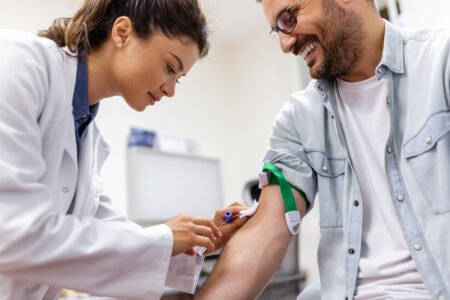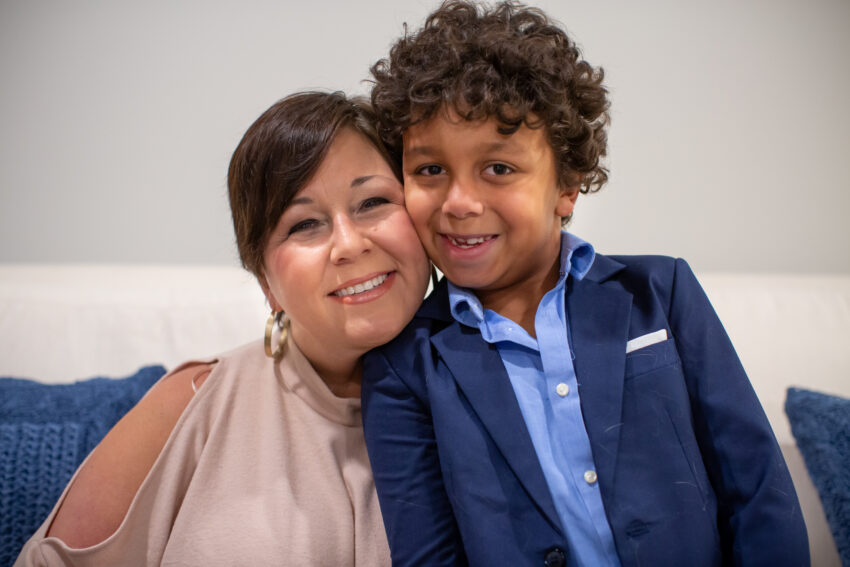
Share On Social!
“The good news is, we can’t kill you trying to save you. You showed up fit to fight.”
Still in shock of recent events, Loriana Hernandez-Aldama tried to process the words of world-renowned oncologist Dr. Mark Levis.
In such a short period of time in January 2014, her life had completely changed.
Just a few days earlier, Loriana, a married mother and TV news anchor with a successful career in Austin and Dallas, Texas, was excitedly working with her fertility doctor to have another baby.
But a precautionary blood test before a traditional embryo transfer revealed a disheartening diagnosis of AML Leukemia, an aggressive blood cancer.
At the advice of her doctor and healthcare connections, she kissed her then 2-year-old son, Gabriel, goodbye, and boarded a plane to Johns Hopkins Hospital in Baltimore, Maryland, for chemotherapy treatment.
Now, she sat in her hospital bed, feeling a complex assortment of emotions.
“You have a 25% chance of surviving,” Dr. Levis said. “And because you present well and are fit, we can max out your treatment doses. You don’t have any comorbidities we have to tiptoe around. You can have the strongest dose of chemo possible.”
Loriana paused, considering this information.
“We don’t all receive the same chemo doses?” she asked.
“No, with some patients, my hands are tied,” Dr. Levis explained. “I can’t give them certain treatments and doses because they have comorbidities – high blood pressure, diabetes, or maybe they’re overweight. In your case though, you’re healthy. We can give you stronger doses of chemo. We can’t kill you trying to save you.”
The oncologist’s repeated blunt words sunk in, and suddenly, Loriana realized that she had been preparing for this fight her entire life.
Preparing for a Cancer Battle
Today, Loriana holds many titles.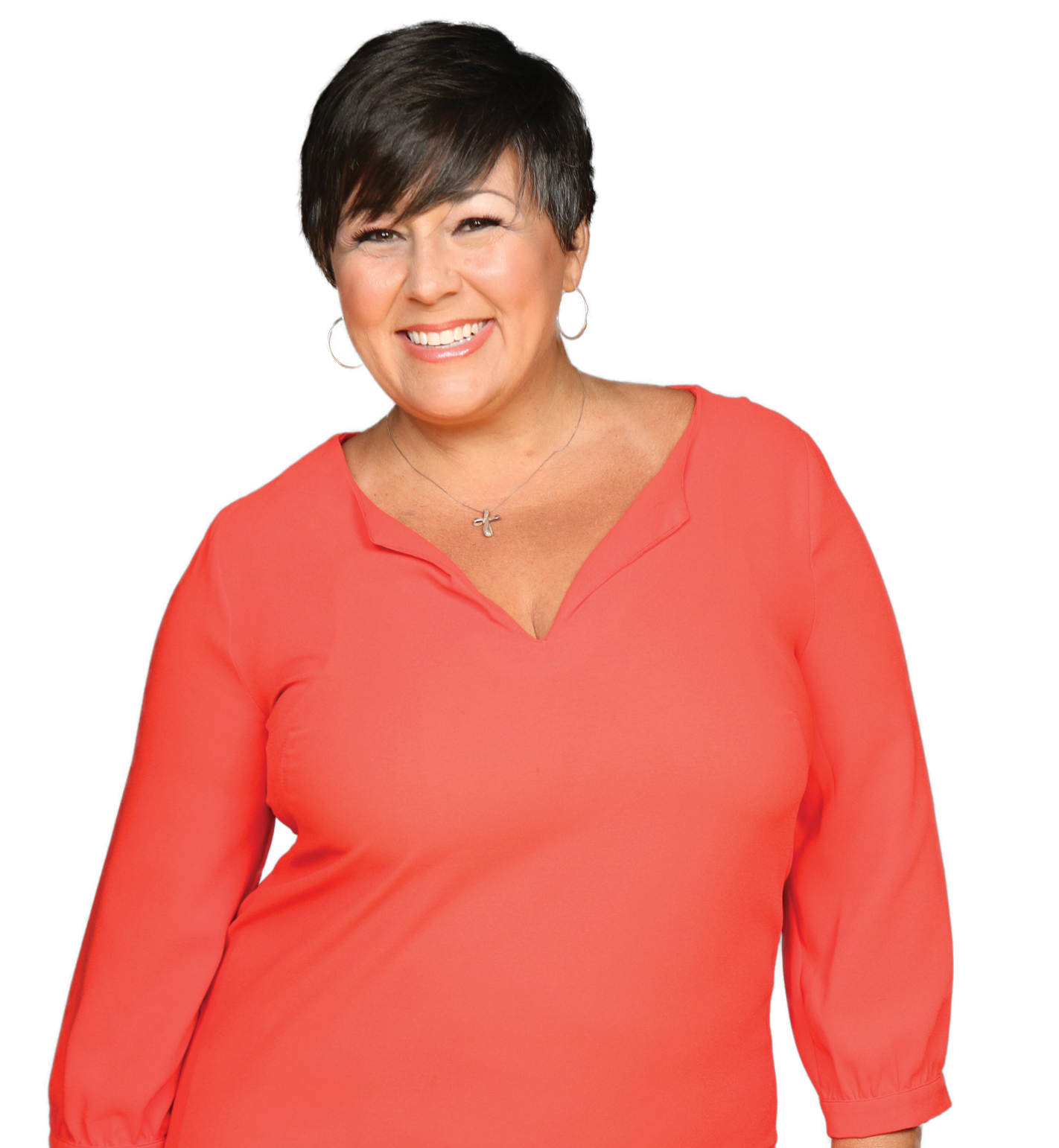
She is a Latina, mother, wife, two-time cancer survivor, patient advocate, educator, and author.
She is also an Emmy Award winning journalist with more than 25 years of experience as a news anchor and medical and fitness reporter.
For years, Loriana shared health advice with the public. She even hosted her own clean-eating news segment on TV.
“I used to tell people to eat this to avoid cancer,” Loriana said. “I was a clean-eating, green-drinking, yoga enthusiast who told people what to eat to avoid the very cancer I was facing. I was healthy – cancer was never supposed to happen to me.”
The irony of her situation made Loriana question the message she was sending to viewers. How could someone so healthy still get cancer?
She realized she needed to shift her mindset and messaging.
“I reported from my hospital bed and explained to my audience that you can’t avoid cancer, because bad things can still happen to you,” Loriana said. “But if you stay healthy, you will be better prepared to fight when the time comes.”
“I didn’t know it, but by living a healthy lifestyle I was preparing for a battle with cancer.”
The Hard Truth About Healthcare Inequities
Throughout her stay at the hospital, Loriana also experienced and witnessed inequities in healthcare and public health that can affect cancer treatment and patient health outcomes.
“I thought about people in my Latino community who suffer from diabetes, high blood pressure, and obesity issues because they might not have the resources for a healthy lifestyle,” Loriana said. “These comorbidities can impact your treatment dose and your chances of survival.”
Some systemic barriers to living a healthy lifestyle in the Latino community include unsafe or underdeveloped neighborhoods, lack of transportation and health insurance, language barriers with healthcare providers, food insecurity, and diet.
“Your zip code, connections, and ethnic background shouldn’t dictate your chance of surviving cancer, but it can,” Loriana said.
Another potentially fatal health inequity Loriana encountered in her cancer treatment journey was the lack of diversity in clinical trials and donor registries.
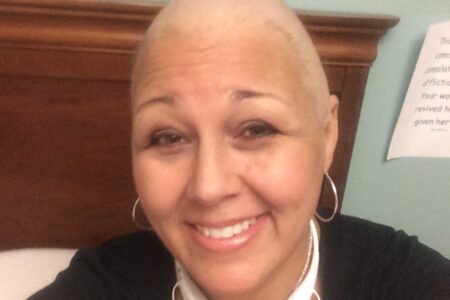 The bone marrow donor registry that could’ve cured Loriana’s cancer contained 70% Caucasian matches, leaving limited matches for minority patients, such as Latinos.
The bone marrow donor registry that could’ve cured Loriana’s cancer contained 70% Caucasian matches, leaving limited matches for minority patients, such as Latinos.
“I’m Cuban and they didn’t have any bone marrow donors to match me,” Loriana said. “Yet, all the people in my hospital hall who were Caucasian had multiple donors who matched them.”
These grim results inspired Loriana’s sister to see if her bone marrow could be a match. Her sister had to pass a special medical test, and they were unsure if she was going to pass.
“The doctors told me, ‘If your sister does not pass, you will succumb to the disease and die,’” Loriana said.
Luckily, her sister passed the test. She was able to help spare Loriana’s life.
Initiating Change in Cancer Healthcare
Unfortunately, unjust health inequities, such as the lack of diversity in clinical trials and donor registries, contribute to cancer being the top cause of death in Latinos.
Even more alarming, Latino cancer cases are expected to rise 142% in the next 10 years because of these health inequities.
Inspired to change the injustices in cancer treatment caused by health inequities, Loriana launched ArmorUp For Life in March 2014, a non-profit organization focused on giving all patients the same access to better treatment options.
“I launched ArmorUp For Life from my bedside three months into my cancer treatment,” Loriana said. “I can think of so many ways that my connections, assertiveness, health literacy, and education helped me be my own hero and save my life. I really had to engineer my own survival. But if you’re not like me, you can fall through the cracks.”
ArmorUp For Life is Helping Patients
ArmorUp For Life inspires, educates, and supports the underserved and underrepresented long before a cancer diagnosis and gives patients the tools for success during diagnosis, treatment, and survivorship.
They support patients in diet, exercise, lifestyle, and spiritual and financial fitness.
ArmorUp For Life continued its important work through COVID-19 and Loriana’s diagnosis with breast cancer on the five-year anniversary of surviving leukemia.
And Loriana, who beat breast cancer after a double mastectomy with its own complications, is more inspired than ever.
The organization is focused on engaging and educating patients about the 3Ps – Prepare, Present, Prevail.
“We are helping patients prepare for an illness through ‘prehabilitation,’ so they can present well to their medical team, and be better positioned to prevail over whatever challenge comes their way,” Loriana explained.
Prehabilitation, or “meeting the medicine halfway” by being as healthy as possible before an illness, can help reduce health risks during disease treatment and increase the chances of survival.
“Prehabilitation is so important, especially in underserved, black and brown communities that may face more challenges in cancer treatment,” Loriana said. “We have to prepare our bodies for illness because something’s going to happen to all of us, we just don’t know when.”
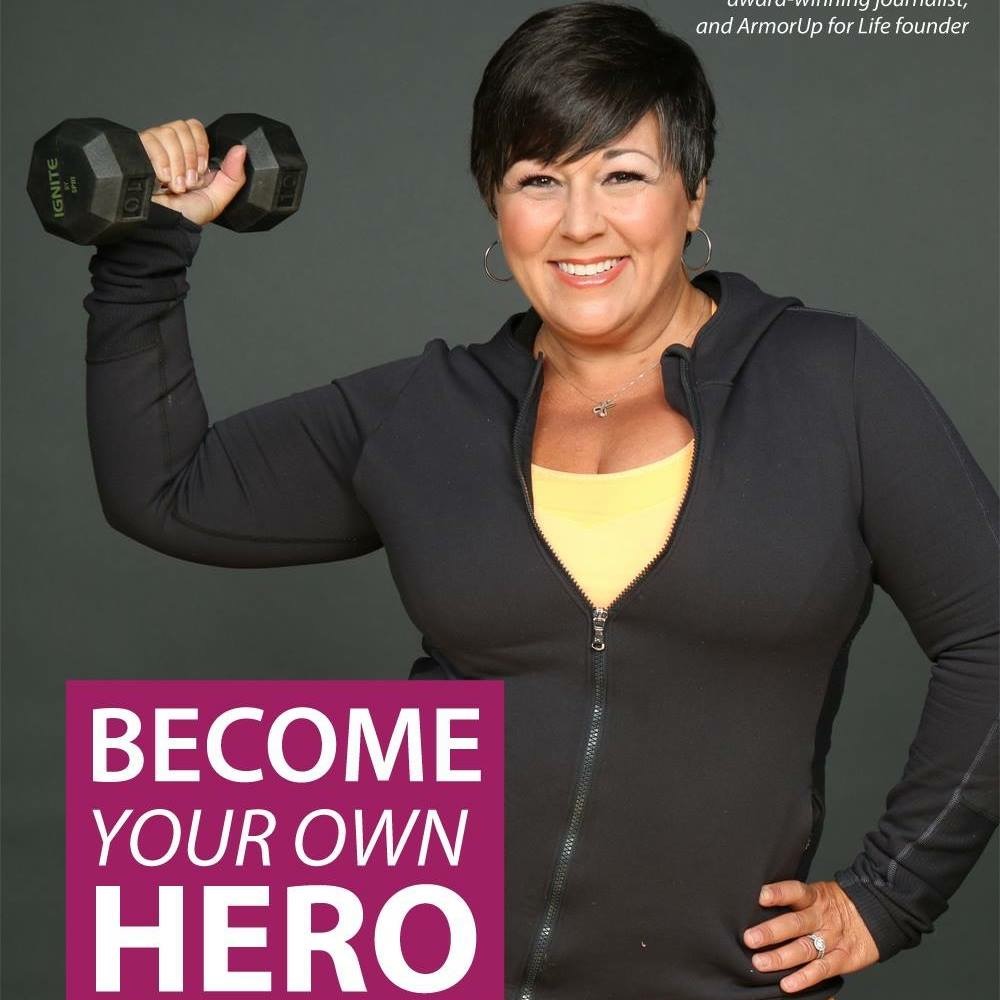 ArmorUp For Life is helping patients practice prehabilitation through community events, educational resources, speaking engagements, and intervention programs.
ArmorUp For Life is helping patients practice prehabilitation through community events, educational resources, speaking engagements, and intervention programs.
The organization also stresses the importance of building a support system of family, friends, and healthcare professionals in the case of illness.
If a patient is unfortunately diagnosed with cancer, ArmorUp For Life connects them with doctors and helps them navigate the complex cancer treatment journey, serving as a patient advocate, especially for disadvantaged patients, such as Latinos.
“I always say rather than asking patients to beat the odds, we have to change the odds by promoting prehabilitation and breaking down some of those barriers to effective treatments,” Loriana said.
ArmorUp For Life is Changing the Healthcare System
But changing the odds of survival should not solely be up to patients.
That’s why ArmorUp For Life inspires healthcare professionals to further implement prehabilitation into patient care, and address health inequities, such as the lack of diversity in clinical trials and donor registries – an injustice that almost cost Loriana her life.
Further, the organization addresses shortcomings in healthcare for cancer survivors, with the hope that healthcare professionals can help implement change.
For example, Loriana explained that there is a lack of resources for survivors to maintain both their mental and physical health after cancer.
“Although chemo and radiation can save your life, they are so toxic to the body,” she said. “When patients survive cancer, they often develop other comorbidities due to the toxicity of treatment, such as neuropathy or a higher risk of infection. They may also develop a secondary cancer, like me. That’s why it’s so important to build survivorship programs to help survivors navigate their health after cancer treatment.”
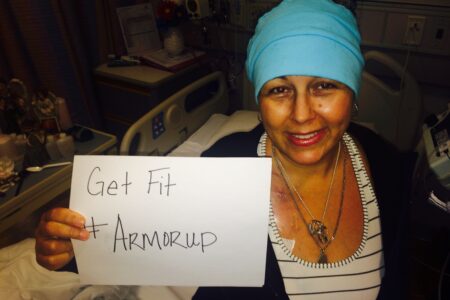
Currently, ArmorUp For Life is working hard to help fund these survivor programs, which will include mental health support.
Loriana openly speaks of her own cancer-related PTSD, of which she seeks treatment.
“Depression and PTSD are quite common for cancer patients and survivors,” she explained. “If you’re not in the game mentally, you may not follow up on your appointments. If you don’t follow up on your appointments, you may miss your screenings. If you miss your screenings, you may miss a critical diagnosis that can change your health outcome.”
Because cancer treatment comes with its consequences, Loriana’s ultimate goal for ArmorUp For Life is to push toward more effective cancer treatment that is less toxic and lessens the risk for secondary cancers and other comorbidities.
ArmorUp For Life’s mission is close to Loriana’s heart because of all that she endured to survive, but the organization means even more to her as she helps countless others, including her family.
Recently, Loriana’s mother was treated for throat cancer, and her sister, the one who saved Loriana’s life, was diagnosed with breast cancer.
“My sister’s terrified because she knows how hard it is,” Loriana said. “I go with her to all her appointments and I’m her voice because not everybody is okay to be transparent about the suffering.”
Loriana adds, “She saved my life, now it’s my turn to help save hers.”
Through all the hardships of cancer, Loriana gives this advice to the public:
- Build your support system of family, friends, and trusted doctors.
- Practice prehabilitation for both your mental and physical health, because no one is invincible.
- If your body is giving you a warning sign, such as continuing pain, see your doctor and push for answers.
“Bad things can still happen to all of us, and the genius of armoring up for life is that you have a chance today to become your own hero and radically change your life trajectory,” Loriana said.
You can also make a difference by participating in a clinical trial to help researchers learn more about preventing, managing, and treating cancer in Latinos.
Without adequate Latino representation in clinical trials, the benefits of these studies may miss this group.
Visit our clinical trials page to find a clinical trial, read about hero volunteers, and more!

By The Numbers
142
Percent
Expected rise in Latino cancer cases in coming years
This success story was produced by Salud America! with support from the Robert Wood Johnson Foundation.
The stories are intended for educational and informative purposes. References to specific policymakers, individuals, schools, policies, or companies have been included solely to advance these purposes and do not constitute an endorsement, sponsorship, or recommendation. Stories are based on and told by real community members and are the opinions and views of the individuals whose stories are told. Organization and activities described were not supported by Salud America! or the Robert Wood Johnson Foundation and do not necessarily represent the views of Salud America! or the Robert Wood Johnson Foundation.



